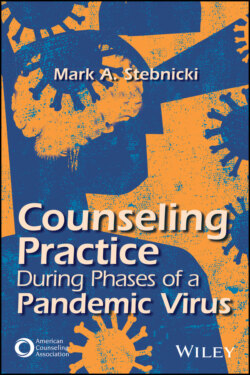Читать книгу Counseling Practice During Phases of a Pandemic Virus - Mark A. Stebnicki - Страница 9
At War With a Pandemic Virus
ОглавлениеWe need to cultivate a fighting spirit in the COVID war as we enter the COVID Generation.1 Disaster mental health response throughout phases of the pandemic virus necessitates a high level of empathy and compassion toward individuals, groups, communities, and cultures who are COVID survivors. As a profession, we are challenged to reconceptualize disaster mental health response as we transition throughout phases of a pandemic virus that some experts project will kill up to 700,000 people in the United States. So how serious is it? The U.S. Department of Defense met the Federal Emergency Management Agency’s request during April 2020 to ship 100,000 body bags to aid state and local governments in managing the growing number of COVID-19 fatalities (Entress et al., 2020). It is worrisome that some Americans still do not take coronaviruses seriously by not using good hygiene, rejecting the COVID-19 vaccines, and dismissing the overall positive effects of the federal government’s immunization program on decreasing deaths related to COVID-19 and its mutant variants. The rate of spread of the infection, accompanied by the severe illness, mortality, and mutant variants of COVID-19, has resulted in long-lasting aftereffects that will likely be with us for the next several years.
We have been at war since the start of 2020 with an unseen enemy combatant, COVID-19. New radical insurgencies of coronavirus mutations have emerged as a threat to humanity. One splinter cell first identified as VUI-202012/01 began its assault in England and moved to the United States in January 2021. By February 2021, this variant as well as South African and Brazil variants had spread throughout most states. The problem with these mutant viruses is that they can spread 50–70% times faster than the original COVID-19 virus. Worldwide, other coronavirus variants have been identified also. The enemy we are confronted with is invisible except to virologists, infectious disease specialists, epidemiologists, and public health experts.
The coronaviruses of the 2020–2021 pandemic have left scars within our memories and hearts, with more than 30 million infections and well more than 550,000 COVID-19-related deaths by early 2021. We have COVID fatigue that manifests as serious medical, physical, and mental health concerns. So how long can we sustain both the pandemic virus and mental health crisis in the United States? Now that the vaccine rollout and immunization have begun, we are trying to restore some normalcy and balance to our lives by reopening schools, businesses, the service industry, entertainment venues, and other areas. It is critical that we try and make ordinary sense out of an extraordinary stressful and traumatic event by adjusting and adapting our strategies on the COVID battlefield.
